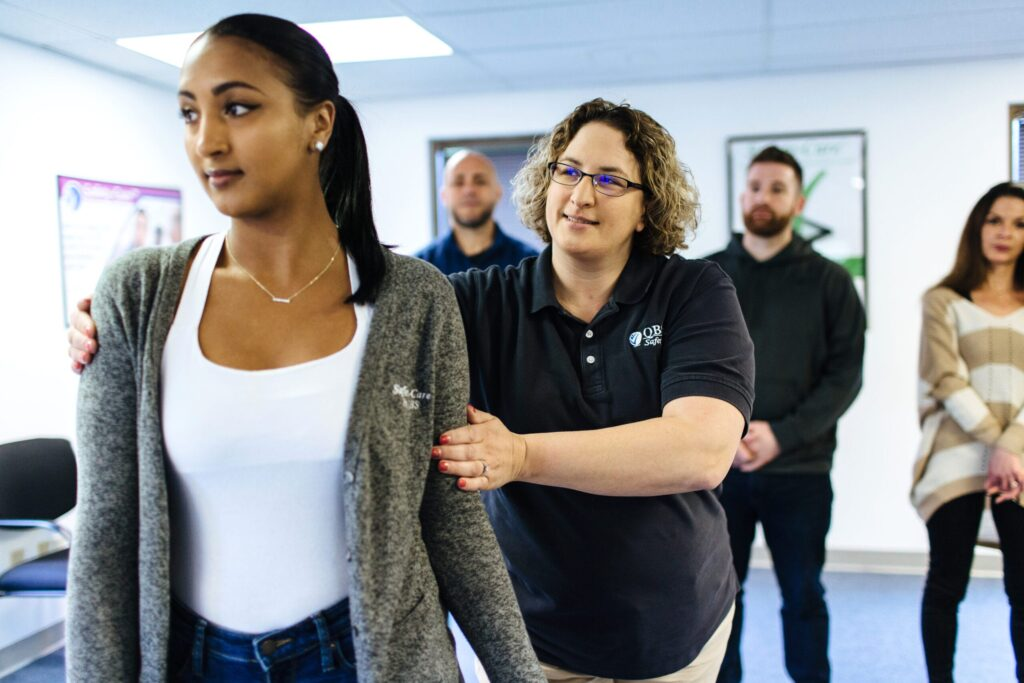North Carolina House Bill 125 – Health Care Security Staff Requirements
House Bill 125 requires all hospitals with an emergency department to develop and implement a security plan, guarantee the presence of a law enforcement officer at all times, and to provide workplace violence prevention training, education and resources to staff.

.png?width=88&height=95&name=Group%20137%20(5).png)


How to Implement Safety-Care?
1. Register for a Safety-Care Trainer class or call us to request a closed session for your organization. We regularly conduct classes in all 50 states and Canada.
2. Complete your class to become a certified Safety-Care Trainer for your organization. We bring you to fluency using an errorless teaching methodology.
3. You train and certify your staff in Safety-Care’s effective techniques.
4. Our Master Trainers are available by phone, email, or video to help your organization with any questions or concerns while using or implementing Safety-Care.

Legal Requirements
|
Summary: Effective: October 2, 2023 Last Updated: December, 2024 House Bill 125 requires all hospitals with an emergency department to develop and implement a security plan, guarantee the presence of a law enforcement officer at all times, and to provide workplace violence prevention training, education and resources to staff. How Safety-Care aligns: Numerous health care organizations throughout the United States and Canada rely upon QBS and our Safety-Care training to provide their staff members with the training they need to help maintain a safe and healthy environment. Safety-Care provides a comprehensive, supportive approach to incident prevention, de-escalation, and management. Your Staff will learn practical strategies for helping students that use evidence-based practices consistent with PBIS (Positive Behavior Interventions and Supports) and ABA (Applied Behavior Analysis). North Carolina House Bill 125 Part VIII Section 8 Applies to each licensed hospital that has an emergency department. |
|
§131E-88 (b) Every hospital that has an emergency department shall implement a security plan with protocols to ensure that at least one law enforcement officer (“LEO”) is present at all times. The security plan shall include: (2) Training for LEOs that is based on a trauma-informed approach to identifying and safely addressing situations where a risk of harm due to mental illness or substance use disorder exists, or individuals who are experiencing a mental health crisis. How Safety-Care aligns: Safety-Care as a training program can be tailored to meet the needs of multiply organizations and professions. All Safety-Care offerings are trauma-informed and utilize PBIS and ABA to ensure that all trainees are equipped with the appropriate responses to challenging behaviors. |
| (3)a. Standards established by a nationally recognized organization that has experience educating and certifying professionals involved in managing and directing security and safety programs in healthcare facilities. How Safety-Care aligns: Safety-Care is uniquely designed to provide trainees with the skills to assess potential crises, how de-escalate these situations, and how to respond if the situation is elevated. Our trainings are trauma-informed and focus on modifying behavior to prevent dangerous outcomes. Safety-Care is focused on encouraging positive behavior prior to the use of any other intervention strategy. Our approach stems from the use of Positive Behavior Intervention and Supports (PBIS) that can prevent and manage challenge behavior. |
|
(5) Training requirements in the potential use of and response to de-escalation techniques, appropriate patient intervention activities, crisis intervention, trauma-informed approaches, weapons and defensive tactics. How Safety-Care aligns: Safety-Care certified individuals are trained to use our Help, Prompt, and Wait strategies as early intervention procedures that effectively de-escalate potential crisis situations before any physical management is necessary. Safety-Care is also based on Applied Behavior Analysis practices and regularly updated with the most current research. This ensures that your staff is fully trained in a system that is focused on de-escalation and is fully trauma-informed. |
|
(d) Every hospital with an emergency department shall provide appropriate hospital workplace violence prevention program training, education, and resources to staff, practitioners, and non-law enforcement officer security personnel. How Safety-Care aligns: Safety-Care is geared towards ensuring that all trainees are familiar with a single response system and can respond in-kind to numerous situations regardless of the professional setting. Having your entire staff trained in Safety-Care will allow for facility-wide system of behavioral supports to encourage a safe and productive learning environment. Safety-Care can be taught to all levels of staff, from administration down to volunteers. Additionally, our core trainings can be supplemented with unique add-on trainings focused on specific needs and professions. |
Why Safety-Care?
Benefits & Differentiators
In addition to Safety-Care being highly cost-effective, you get:

Skills to effectively prevent, minimize, & manage behavioral challenges with dignity, safety, & the possibility of change

Decreases in staff and patient injuries and reduction in restraint & seclusion time

Instructional procedures based on decades of evidence-based research & compatible with ABA, PBIS & reinforcement-based environments

Customizable program for your setting, staff & clientele, with a strong focus on preventative via non-intrusive, replacement behaviors

Extremely rigorous standards grounded in errorless teaching methodology

Small, intimate class sizes backed by unlimited support & resources
How Is Safety-Care So Effective?
A Genuine Focus on Implementing & Managing Positive Behavioral Skills
Proactive, environmental management recommendations
Understanding of evocative effects of staff behavior
In-depth analysis of antecedents and proactive antecedent interventions
Evidence-based reinforcement procedures
Required competency in de-escalation skills
Humane, non-invasive touch and QBS Check™ strategies
Evidence-based teaching procedures
Applicable to a wide array of settings, conditions & challenging behavior





